Dissertation Proposal: Ecotourism Opportunities for TUI in the UK
VerifiedAdded on 2023/01/19
|12
|4292
|87
Project
AI Summary
This dissertation proposal investigates the ecotourism opportunities available to TUI, a major travel agency in the UK. The research aims to identify current trends in ecotourism, evaluate strategies for leveraging social media marketing, assess the challenges TUI faces in this sector, and recommend effective strategies for the company. The proposal outlines the research methodology, including qualitative data collection through an inductive approach and analysis of various research philosophies like positivism and interpretivism. The literature review covers the latest trends in ecotourism, strategies for utilizing social media marketing, and challenges TUI encounters. The study's significance lies in the growing public preference for unique travel experiences and the potential for TUI to innovate and attract customers. The objectives include identifying ecotourism trends, determining effective marketing strategies, and evaluating challenges to recommend strategies for TUI's success in the UK market.
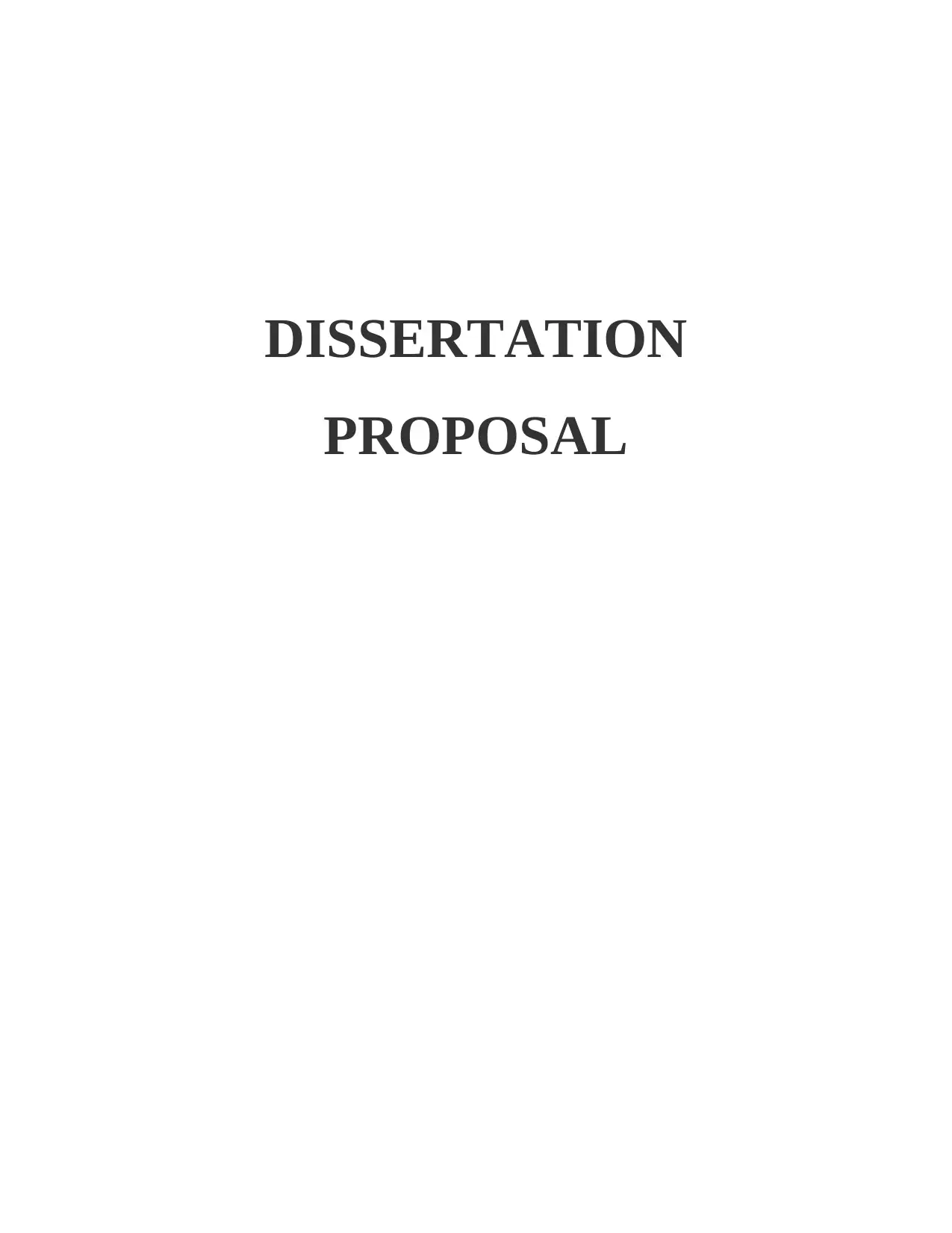
DISSERTATION
PROPOSAL
PROPOSAL
Paraphrase This Document
Need a fresh take? Get an instant paraphrase of this document with our AI Paraphraser
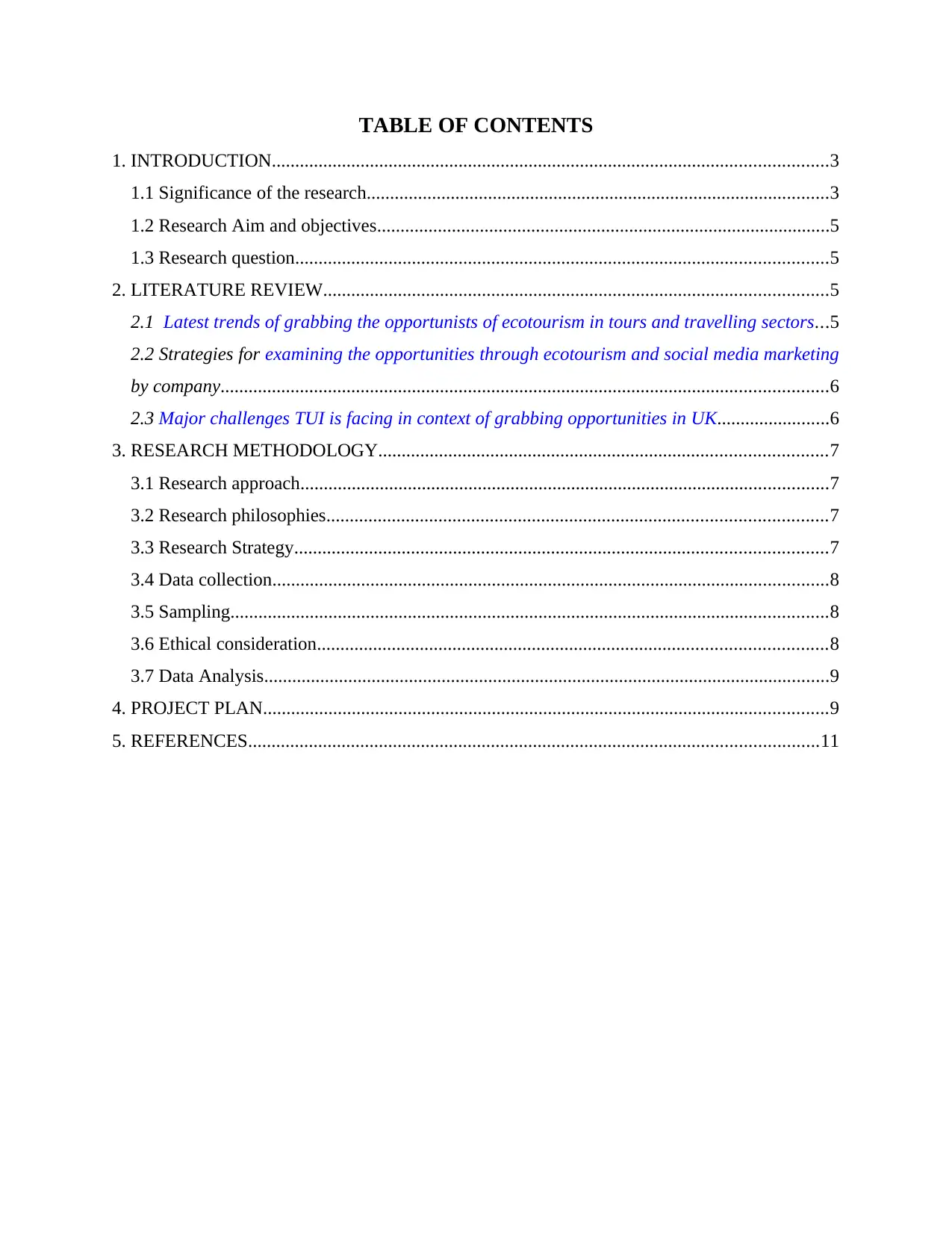
TABLE OF CONTENTS
1. INTRODUCTION.......................................................................................................................3
1.1 Significance of the research...................................................................................................3
1.2 Research Aim and objectives.................................................................................................5
1.3 Research question..................................................................................................................5
2. LITERATURE REVIEW............................................................................................................5
2.1 Latest trends of grabbing the opportunists of ecotourism in tours and travelling sectors...5
2.2 Strategies for examining the opportunities through ecotourism and social media marketing
by company..................................................................................................................................6
2.3 Major challenges TUI is facing in context of grabbing opportunities in UK........................6
3. RESEARCH METHODOLOGY................................................................................................7
3.1 Research approach.................................................................................................................7
3.2 Research philosophies...........................................................................................................7
3.3 Research Strategy..................................................................................................................7
3.4 Data collection.......................................................................................................................8
3.5 Sampling................................................................................................................................8
3.6 Ethical consideration.............................................................................................................8
3.7 Data Analysis.........................................................................................................................9
4. PROJECT PLAN.........................................................................................................................9
5. REFERENCES..........................................................................................................................11
1. INTRODUCTION.......................................................................................................................3
1.1 Significance of the research...................................................................................................3
1.2 Research Aim and objectives.................................................................................................5
1.3 Research question..................................................................................................................5
2. LITERATURE REVIEW............................................................................................................5
2.1 Latest trends of grabbing the opportunists of ecotourism in tours and travelling sectors...5
2.2 Strategies for examining the opportunities through ecotourism and social media marketing
by company..................................................................................................................................6
2.3 Major challenges TUI is facing in context of grabbing opportunities in UK........................6
3. RESEARCH METHODOLOGY................................................................................................7
3.1 Research approach.................................................................................................................7
3.2 Research philosophies...........................................................................................................7
3.3 Research Strategy..................................................................................................................7
3.4 Data collection.......................................................................................................................8
3.5 Sampling................................................................................................................................8
3.6 Ethical consideration.............................................................................................................8
3.7 Data Analysis.........................................................................................................................9
4. PROJECT PLAN.........................................................................................................................9
5. REFERENCES..........................................................................................................................11
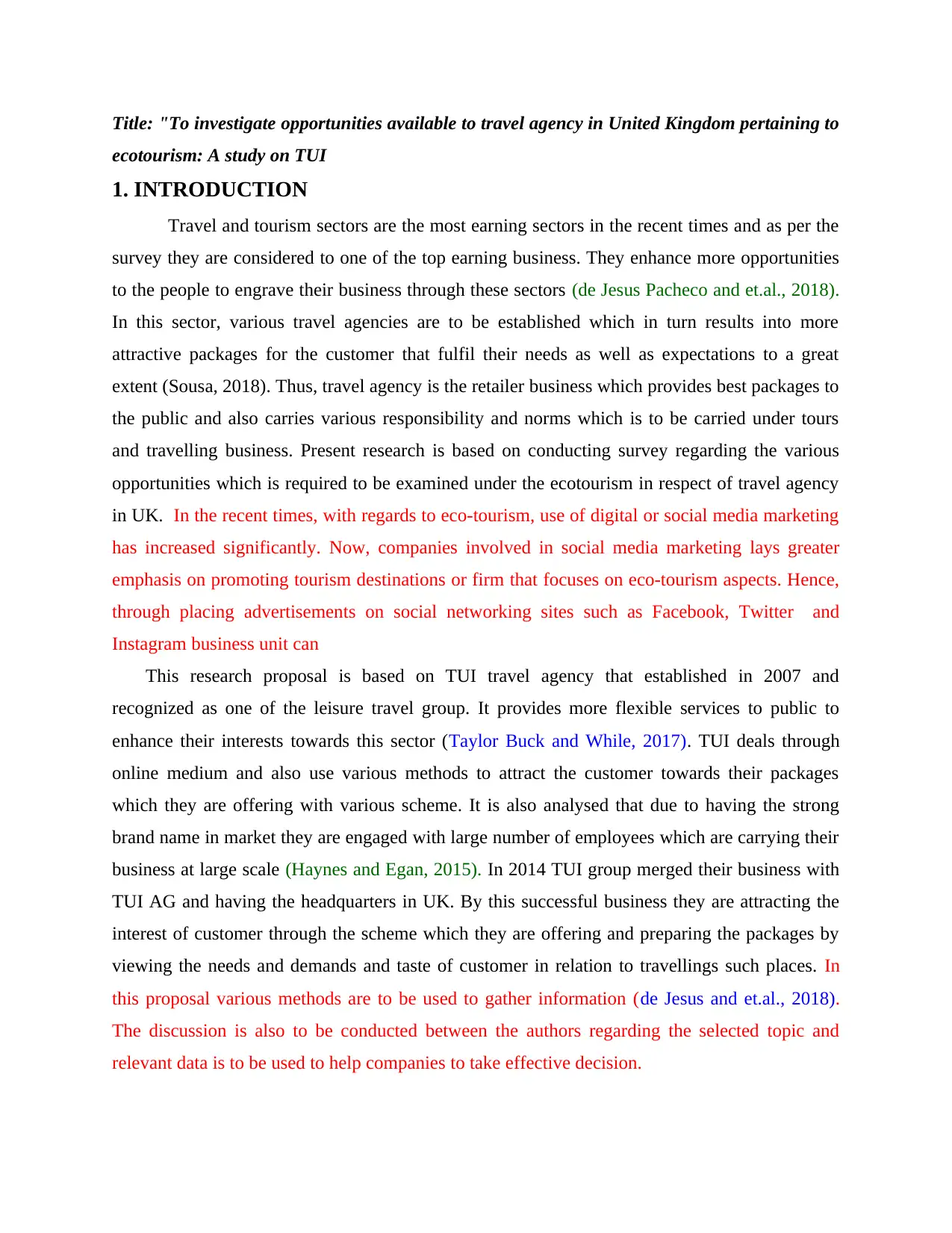
Title: "To investigate opportunities available to travel agency in United Kingdom pertaining to
ecotourism: A study on TUI
1. INTRODUCTION
Travel and tourism sectors are the most earning sectors in the recent times and as per the
survey they are considered to one of the top earning business. They enhance more opportunities
to the people to engrave their business through these sectors (de Jesus Pacheco and et.al., 2018).
In this sector, various travel agencies are to be established which in turn results into more
attractive packages for the customer that fulfil their needs as well as expectations to a great
extent (Sousa, 2018). Thus, travel agency is the retailer business which provides best packages to
the public and also carries various responsibility and norms which is to be carried under tours
and travelling business. Present research is based on conducting survey regarding the various
opportunities which is required to be examined under the ecotourism in respect of travel agency
in UK. In the recent times, with regards to eco-tourism, use of digital or social media marketing
has increased significantly. Now, companies involved in social media marketing lays greater
emphasis on promoting tourism destinations or firm that focuses on eco-tourism aspects. Hence,
through placing advertisements on social networking sites such as Facebook, Twitter and
Instagram business unit can
This research proposal is based on TUI travel agency that established in 2007 and
recognized as one of the leisure travel group. It provides more flexible services to public to
enhance their interests towards this sector (Taylor Buck and While, 2017). TUI deals through
online medium and also use various methods to attract the customer towards their packages
which they are offering with various scheme. It is also analysed that due to having the strong
brand name in market they are engaged with large number of employees which are carrying their
business at large scale (Haynes and Egan, 2015). In 2014 TUI group merged their business with
TUI AG and having the headquarters in UK. By this successful business they are attracting the
interest of customer through the scheme which they are offering and preparing the packages by
viewing the needs and demands and taste of customer in relation to travellings such places. In
this proposal various methods are to be used to gather information (de Jesus and et.al., 2018).
The discussion is also to be conducted between the authors regarding the selected topic and
relevant data is to be used to help companies to take effective decision.
ecotourism: A study on TUI
1. INTRODUCTION
Travel and tourism sectors are the most earning sectors in the recent times and as per the
survey they are considered to one of the top earning business. They enhance more opportunities
to the people to engrave their business through these sectors (de Jesus Pacheco and et.al., 2018).
In this sector, various travel agencies are to be established which in turn results into more
attractive packages for the customer that fulfil their needs as well as expectations to a great
extent (Sousa, 2018). Thus, travel agency is the retailer business which provides best packages to
the public and also carries various responsibility and norms which is to be carried under tours
and travelling business. Present research is based on conducting survey regarding the various
opportunities which is required to be examined under the ecotourism in respect of travel agency
in UK. In the recent times, with regards to eco-tourism, use of digital or social media marketing
has increased significantly. Now, companies involved in social media marketing lays greater
emphasis on promoting tourism destinations or firm that focuses on eco-tourism aspects. Hence,
through placing advertisements on social networking sites such as Facebook, Twitter and
Instagram business unit can
This research proposal is based on TUI travel agency that established in 2007 and
recognized as one of the leisure travel group. It provides more flexible services to public to
enhance their interests towards this sector (Taylor Buck and While, 2017). TUI deals through
online medium and also use various methods to attract the customer towards their packages
which they are offering with various scheme. It is also analysed that due to having the strong
brand name in market they are engaged with large number of employees which are carrying their
business at large scale (Haynes and Egan, 2015). In 2014 TUI group merged their business with
TUI AG and having the headquarters in UK. By this successful business they are attracting the
interest of customer through the scheme which they are offering and preparing the packages by
viewing the needs and demands and taste of customer in relation to travellings such places. In
this proposal various methods are to be used to gather information (de Jesus and et.al., 2018).
The discussion is also to be conducted between the authors regarding the selected topic and
relevant data is to be used to help companies to take effective decision.
⊘ This is a preview!⊘
Do you want full access?
Subscribe today to unlock all pages.

Trusted by 1+ million students worldwide
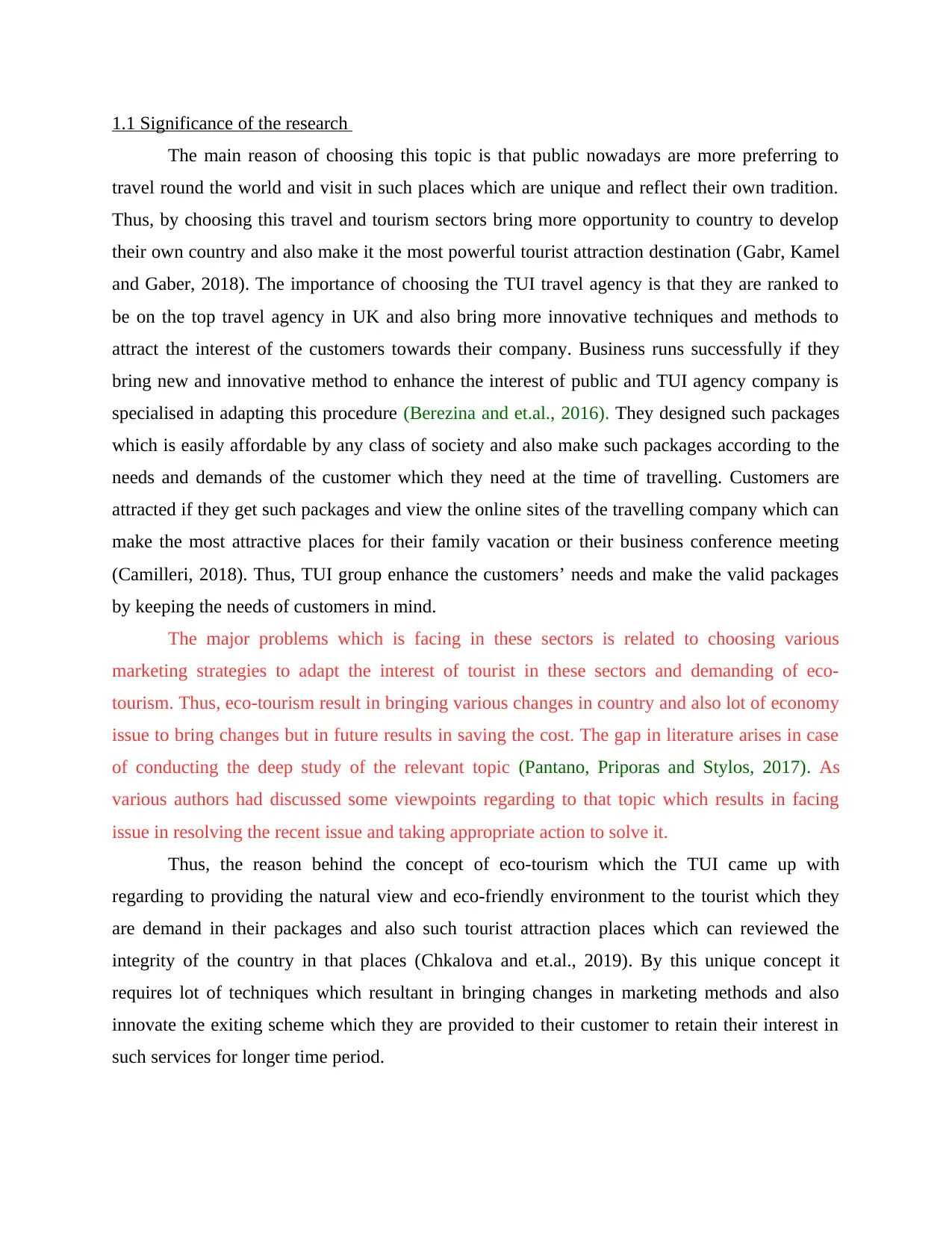
1.1 Significance of the research
The main reason of choosing this topic is that public nowadays are more preferring to
travel round the world and visit in such places which are unique and reflect their own tradition.
Thus, by choosing this travel and tourism sectors bring more opportunity to country to develop
their own country and also make it the most powerful tourist attraction destination (Gabr, Kamel
and Gaber, 2018). The importance of choosing the TUI travel agency is that they are ranked to
be on the top travel agency in UK and also bring more innovative techniques and methods to
attract the interest of the customers towards their company. Business runs successfully if they
bring new and innovative method to enhance the interest of public and TUI agency company is
specialised in adapting this procedure (Berezina and et.al., 2016). They designed such packages
which is easily affordable by any class of society and also make such packages according to the
needs and demands of the customer which they need at the time of travelling. Customers are
attracted if they get such packages and view the online sites of the travelling company which can
make the most attractive places for their family vacation or their business conference meeting
(Camilleri, 2018). Thus, TUI group enhance the customers’ needs and make the valid packages
by keeping the needs of customers in mind.
The major problems which is facing in these sectors is related to choosing various
marketing strategies to adapt the interest of tourist in these sectors and demanding of eco-
tourism. Thus, eco-tourism result in bringing various changes in country and also lot of economy
issue to bring changes but in future results in saving the cost. The gap in literature arises in case
of conducting the deep study of the relevant topic (Pantano, Priporas and Stylos, 2017). As
various authors had discussed some viewpoints regarding to that topic which results in facing
issue in resolving the recent issue and taking appropriate action to solve it.
Thus, the reason behind the concept of eco-tourism which the TUI came up with
regarding to providing the natural view and eco-friendly environment to the tourist which they
are demand in their packages and also such tourist attraction places which can reviewed the
integrity of the country in that places (Chkalova and et.al., 2019). By this unique concept it
requires lot of techniques which resultant in bringing changes in marketing methods and also
innovate the exiting scheme which they are provided to their customer to retain their interest in
such services for longer time period.
The main reason of choosing this topic is that public nowadays are more preferring to
travel round the world and visit in such places which are unique and reflect their own tradition.
Thus, by choosing this travel and tourism sectors bring more opportunity to country to develop
their own country and also make it the most powerful tourist attraction destination (Gabr, Kamel
and Gaber, 2018). The importance of choosing the TUI travel agency is that they are ranked to
be on the top travel agency in UK and also bring more innovative techniques and methods to
attract the interest of the customers towards their company. Business runs successfully if they
bring new and innovative method to enhance the interest of public and TUI agency company is
specialised in adapting this procedure (Berezina and et.al., 2016). They designed such packages
which is easily affordable by any class of society and also make such packages according to the
needs and demands of the customer which they need at the time of travelling. Customers are
attracted if they get such packages and view the online sites of the travelling company which can
make the most attractive places for their family vacation or their business conference meeting
(Camilleri, 2018). Thus, TUI group enhance the customers’ needs and make the valid packages
by keeping the needs of customers in mind.
The major problems which is facing in these sectors is related to choosing various
marketing strategies to adapt the interest of tourist in these sectors and demanding of eco-
tourism. Thus, eco-tourism result in bringing various changes in country and also lot of economy
issue to bring changes but in future results in saving the cost. The gap in literature arises in case
of conducting the deep study of the relevant topic (Pantano, Priporas and Stylos, 2017). As
various authors had discussed some viewpoints regarding to that topic which results in facing
issue in resolving the recent issue and taking appropriate action to solve it.
Thus, the reason behind the concept of eco-tourism which the TUI came up with
regarding to providing the natural view and eco-friendly environment to the tourist which they
are demand in their packages and also such tourist attraction places which can reviewed the
integrity of the country in that places (Chkalova and et.al., 2019). By this unique concept it
requires lot of techniques which resultant in bringing changes in marketing methods and also
innovate the exiting scheme which they are provided to their customer to retain their interest in
such services for longer time period.
Paraphrase This Document
Need a fresh take? Get an instant paraphrase of this document with our AI Paraphraser
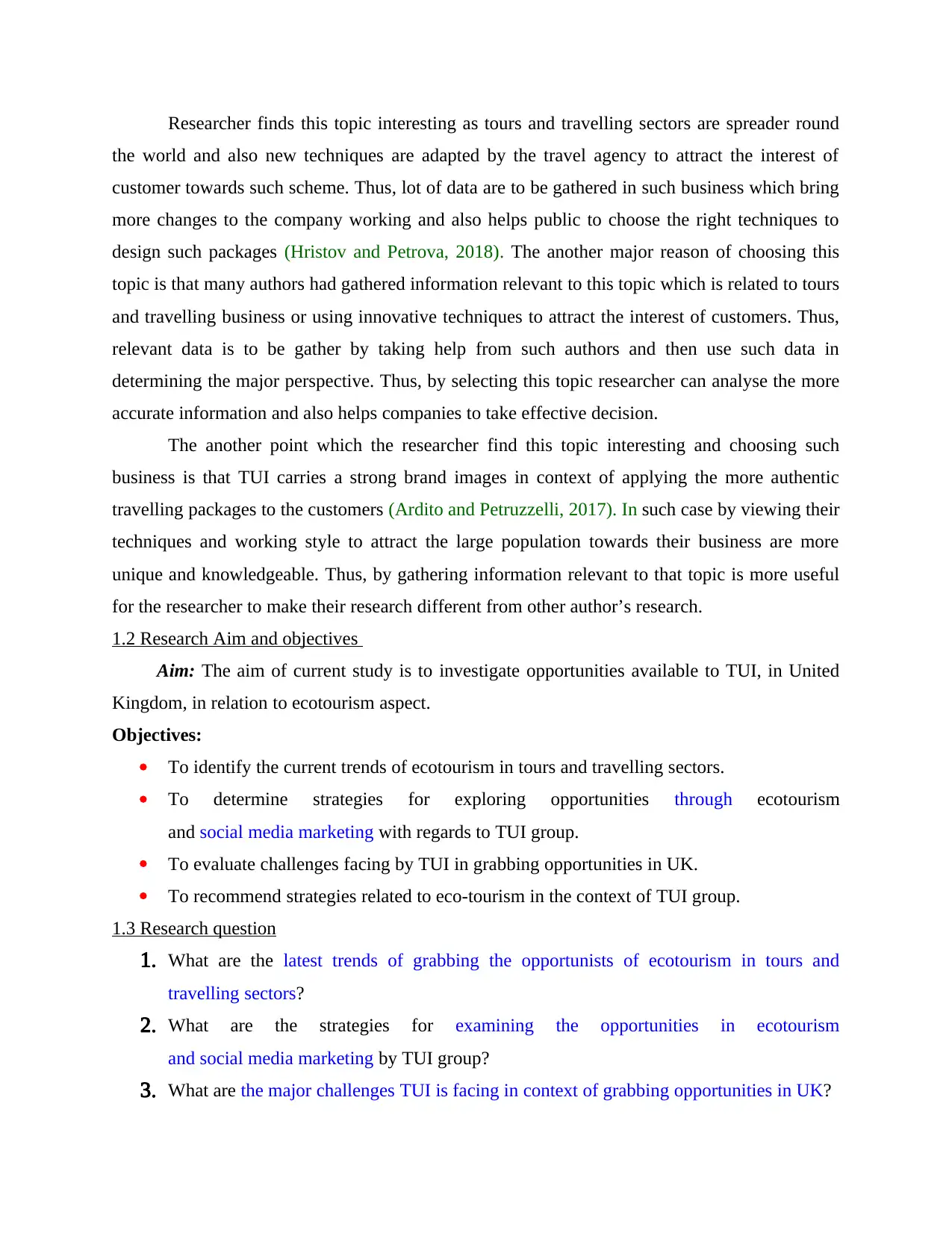
Researcher finds this topic interesting as tours and travelling sectors are spreader round
the world and also new techniques are adapted by the travel agency to attract the interest of
customer towards such scheme. Thus, lot of data are to be gathered in such business which bring
more changes to the company working and also helps public to choose the right techniques to
design such packages (Hristov and Petrova, 2018). The another major reason of choosing this
topic is that many authors had gathered information relevant to this topic which is related to tours
and travelling business or using innovative techniques to attract the interest of customers. Thus,
relevant data is to be gather by taking help from such authors and then use such data in
determining the major perspective. Thus, by selecting this topic researcher can analyse the more
accurate information and also helps companies to take effective decision.
The another point which the researcher find this topic interesting and choosing such
business is that TUI carries a strong brand images in context of applying the more authentic
travelling packages to the customers (Ardito and Petruzzelli, 2017). In such case by viewing their
techniques and working style to attract the large population towards their business are more
unique and knowledgeable. Thus, by gathering information relevant to that topic is more useful
for the researcher to make their research different from other author’s research.
1.2 Research Aim and objectives
Aim: The aim of current study is to investigate opportunities available to TUI, in United
Kingdom, in relation to ecotourism aspect.
Objectives:
To identify the current trends of ecotourism in tours and travelling sectors.
To determine strategies for exploring opportunities through ecotourism
and social media marketing with regards to TUI group.
To evaluate challenges facing by TUI in grabbing opportunities in UK.
To recommend strategies related to eco-tourism in the context of TUI group.
1.3 Research question
1. What are the latest trends of grabbing the opportunists of ecotourism in tours and
travelling sectors?
2. What are the strategies for examining the opportunities in ecotourism
and social media marketing by TUI group?
3. What are the major challenges TUI is facing in context of grabbing opportunities in UK?
the world and also new techniques are adapted by the travel agency to attract the interest of
customer towards such scheme. Thus, lot of data are to be gathered in such business which bring
more changes to the company working and also helps public to choose the right techniques to
design such packages (Hristov and Petrova, 2018). The another major reason of choosing this
topic is that many authors had gathered information relevant to this topic which is related to tours
and travelling business or using innovative techniques to attract the interest of customers. Thus,
relevant data is to be gather by taking help from such authors and then use such data in
determining the major perspective. Thus, by selecting this topic researcher can analyse the more
accurate information and also helps companies to take effective decision.
The another point which the researcher find this topic interesting and choosing such
business is that TUI carries a strong brand images in context of applying the more authentic
travelling packages to the customers (Ardito and Petruzzelli, 2017). In such case by viewing their
techniques and working style to attract the large population towards their business are more
unique and knowledgeable. Thus, by gathering information relevant to that topic is more useful
for the researcher to make their research different from other author’s research.
1.2 Research Aim and objectives
Aim: The aim of current study is to investigate opportunities available to TUI, in United
Kingdom, in relation to ecotourism aspect.
Objectives:
To identify the current trends of ecotourism in tours and travelling sectors.
To determine strategies for exploring opportunities through ecotourism
and social media marketing with regards to TUI group.
To evaluate challenges facing by TUI in grabbing opportunities in UK.
To recommend strategies related to eco-tourism in the context of TUI group.
1.3 Research question
1. What are the latest trends of grabbing the opportunists of ecotourism in tours and
travelling sectors?
2. What are the strategies for examining the opportunities in ecotourism
and social media marketing by TUI group?
3. What are the major challenges TUI is facing in context of grabbing opportunities in UK?
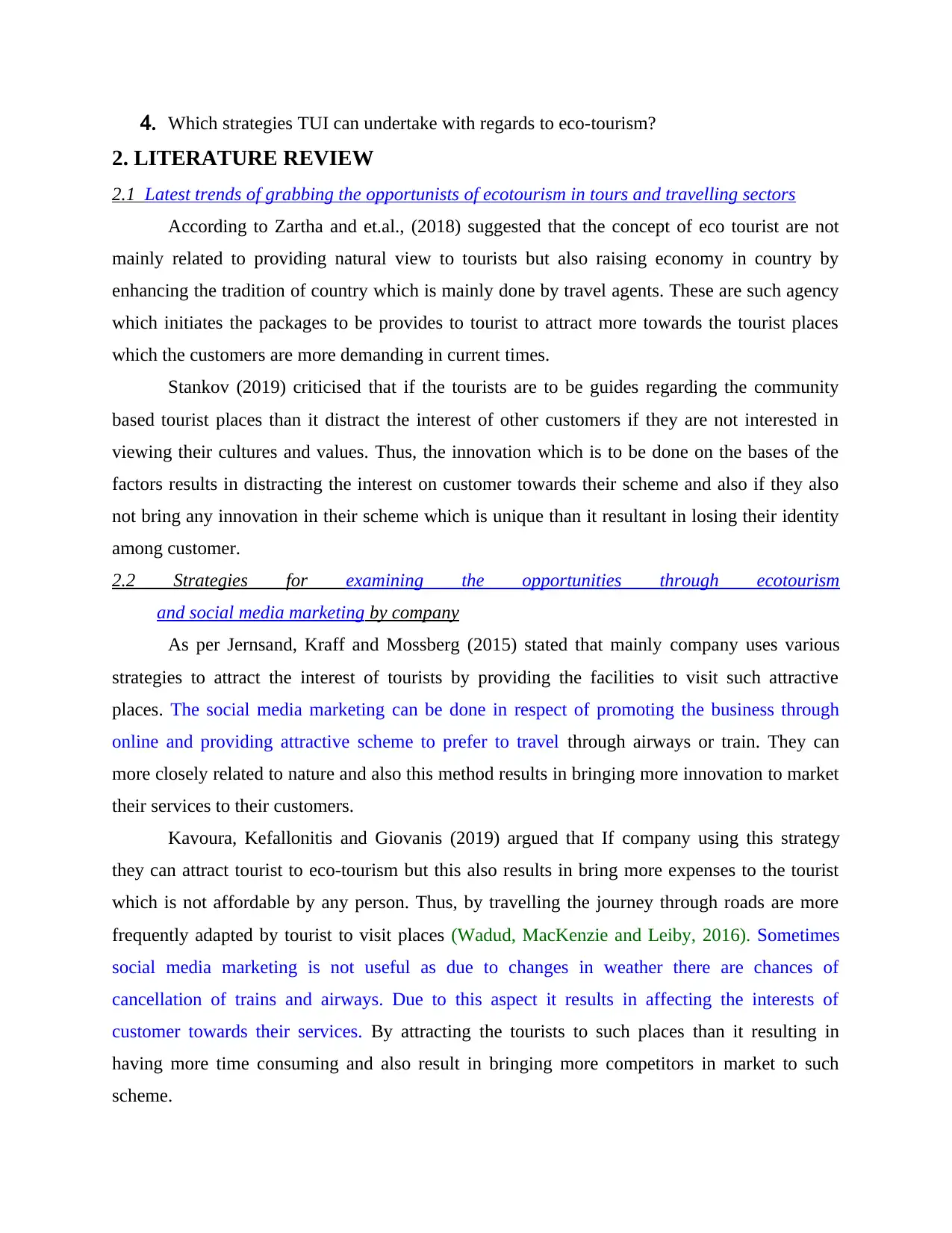
4. Which strategies TUI can undertake with regards to eco-tourism?
2. LITERATURE REVIEW
2.1 Latest trends of grabbing the opportunists of ecotourism in tours and travelling sectors
According to Zartha and et.al., (2018) suggested that the concept of eco tourist are not
mainly related to providing natural view to tourists but also raising economy in country by
enhancing the tradition of country which is mainly done by travel agents. These are such agency
which initiates the packages to be provides to tourist to attract more towards the tourist places
which the customers are more demanding in current times.
Stankov (2019) criticised that if the tourists are to be guides regarding the community
based tourist places than it distract the interest of other customers if they are not interested in
viewing their cultures and values. Thus, the innovation which is to be done on the bases of the
factors results in distracting the interest on customer towards their scheme and also if they also
not bring any innovation in their scheme which is unique than it resultant in losing their identity
among customer.
2.2 Strategies for examining the opportunities through ecotourism
and social media marketing by company
As per Jernsand, Kraff and Mossberg (2015) stated that mainly company uses various
strategies to attract the interest of tourists by providing the facilities to visit such attractive
places. The social media marketing can be done in respect of promoting the business through
online and providing attractive scheme to prefer to travel through airways or train. They can
more closely related to nature and also this method results in bringing more innovation to market
their services to their customers.
Kavoura, Kefallonitis and Giovanis (2019) argued that If company using this strategy
they can attract tourist to eco-tourism but this also results in bring more expenses to the tourist
which is not affordable by any person. Thus, by travelling the journey through roads are more
frequently adapted by tourist to visit places (Wadud, MacKenzie and Leiby, 2016). Sometimes
social media marketing is not useful as due to changes in weather there are chances of
cancellation of trains and airways. Due to this aspect it results in affecting the interests of
customer towards their services. By attracting the tourists to such places than it resulting in
having more time consuming and also result in bringing more competitors in market to such
scheme.
2. LITERATURE REVIEW
2.1 Latest trends of grabbing the opportunists of ecotourism in tours and travelling sectors
According to Zartha and et.al., (2018) suggested that the concept of eco tourist are not
mainly related to providing natural view to tourists but also raising economy in country by
enhancing the tradition of country which is mainly done by travel agents. These are such agency
which initiates the packages to be provides to tourist to attract more towards the tourist places
which the customers are more demanding in current times.
Stankov (2019) criticised that if the tourists are to be guides regarding the community
based tourist places than it distract the interest of other customers if they are not interested in
viewing their cultures and values. Thus, the innovation which is to be done on the bases of the
factors results in distracting the interest on customer towards their scheme and also if they also
not bring any innovation in their scheme which is unique than it resultant in losing their identity
among customer.
2.2 Strategies for examining the opportunities through ecotourism
and social media marketing by company
As per Jernsand, Kraff and Mossberg (2015) stated that mainly company uses various
strategies to attract the interest of tourists by providing the facilities to visit such attractive
places. The social media marketing can be done in respect of promoting the business through
online and providing attractive scheme to prefer to travel through airways or train. They can
more closely related to nature and also this method results in bringing more innovation to market
their services to their customers.
Kavoura, Kefallonitis and Giovanis (2019) argued that If company using this strategy
they can attract tourist to eco-tourism but this also results in bring more expenses to the tourist
which is not affordable by any person. Thus, by travelling the journey through roads are more
frequently adapted by tourist to visit places (Wadud, MacKenzie and Leiby, 2016). Sometimes
social media marketing is not useful as due to changes in weather there are chances of
cancellation of trains and airways. Due to this aspect it results in affecting the interests of
customer towards their services. By attracting the tourists to such places than it resulting in
having more time consuming and also result in bringing more competitors in market to such
scheme.
⊘ This is a preview!⊘
Do you want full access?
Subscribe today to unlock all pages.

Trusted by 1+ million students worldwide
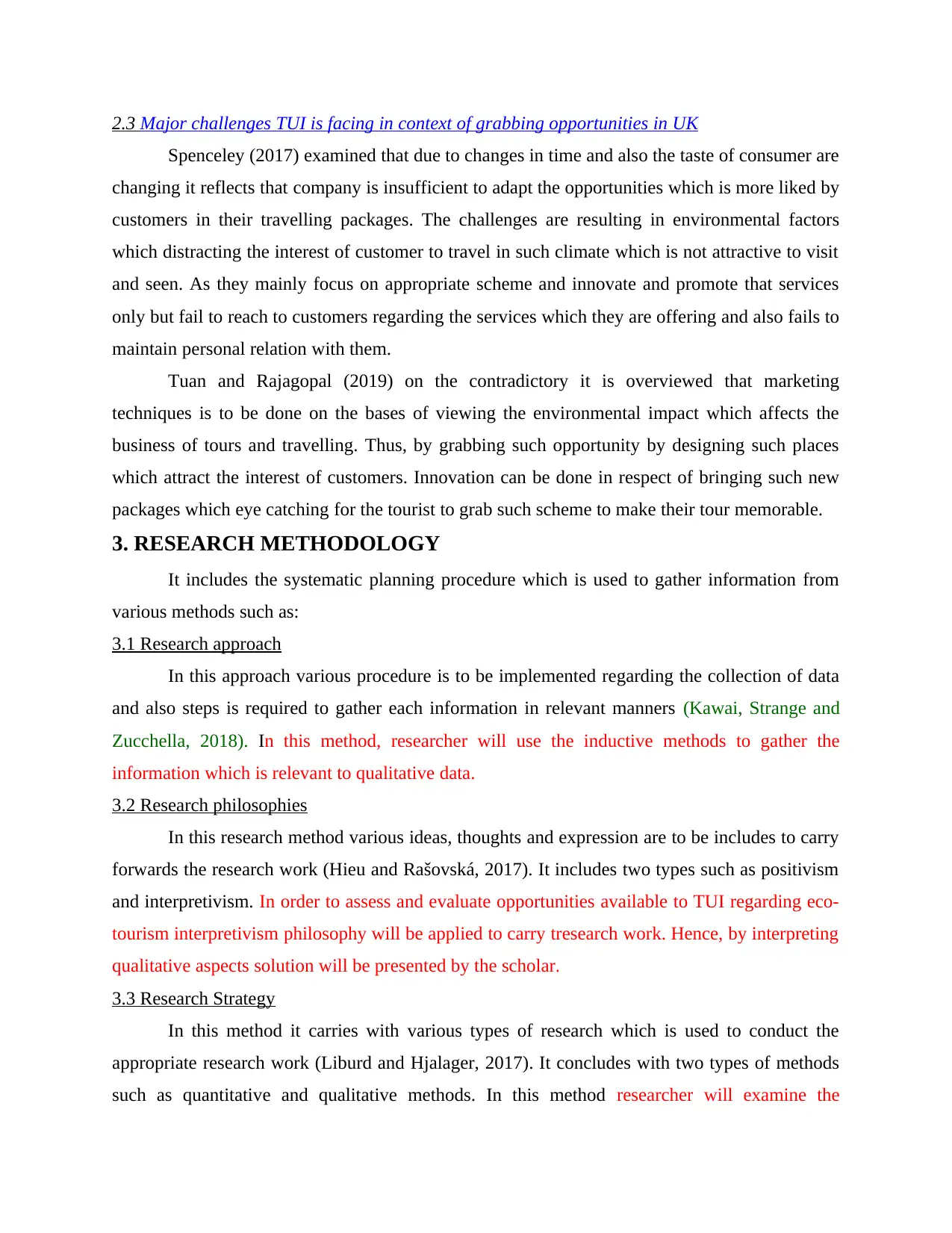
2.3 Major challenges TUI is facing in context of grabbing opportunities in UK
Spenceley (2017) examined that due to changes in time and also the taste of consumer are
changing it reflects that company is insufficient to adapt the opportunities which is more liked by
customers in their travelling packages. The challenges are resulting in environmental factors
which distracting the interest of customer to travel in such climate which is not attractive to visit
and seen. As they mainly focus on appropriate scheme and innovate and promote that services
only but fail to reach to customers regarding the services which they are offering and also fails to
maintain personal relation with them.
Tuan and Rajagopal (2019) on the contradictory it is overviewed that marketing
techniques is to be done on the bases of viewing the environmental impact which affects the
business of tours and travelling. Thus, by grabbing such opportunity by designing such places
which attract the interest of customers. Innovation can be done in respect of bringing such new
packages which eye catching for the tourist to grab such scheme to make their tour memorable.
3. RESEARCH METHODOLOGY
It includes the systematic planning procedure which is used to gather information from
various methods such as:
3.1 Research approach
In this approach various procedure is to be implemented regarding the collection of data
and also steps is required to gather each information in relevant manners (Kawai, Strange and
Zucchella, 2018). In this method, researcher will use the inductive methods to gather the
information which is relevant to qualitative data.
3.2 Research philosophies
In this research method various ideas, thoughts and expression are to be includes to carry
forwards the research work (Hieu and Rašovská, 2017). It includes two types such as positivism
and interpretivism. In order to assess and evaluate opportunities available to TUI regarding eco-
tourism interpretivism philosophy will be applied to carry tresearch work. Hence, by interpreting
qualitative aspects solution will be presented by the scholar.
3.3 Research Strategy
In this method it carries with various types of research which is used to conduct the
appropriate research work (Liburd and Hjalager, 2017). It concludes with two types of methods
such as quantitative and qualitative methods. In this method researcher will examine the
Spenceley (2017) examined that due to changes in time and also the taste of consumer are
changing it reflects that company is insufficient to adapt the opportunities which is more liked by
customers in their travelling packages. The challenges are resulting in environmental factors
which distracting the interest of customer to travel in such climate which is not attractive to visit
and seen. As they mainly focus on appropriate scheme and innovate and promote that services
only but fail to reach to customers regarding the services which they are offering and also fails to
maintain personal relation with them.
Tuan and Rajagopal (2019) on the contradictory it is overviewed that marketing
techniques is to be done on the bases of viewing the environmental impact which affects the
business of tours and travelling. Thus, by grabbing such opportunity by designing such places
which attract the interest of customers. Innovation can be done in respect of bringing such new
packages which eye catching for the tourist to grab such scheme to make their tour memorable.
3. RESEARCH METHODOLOGY
It includes the systematic planning procedure which is used to gather information from
various methods such as:
3.1 Research approach
In this approach various procedure is to be implemented regarding the collection of data
and also steps is required to gather each information in relevant manners (Kawai, Strange and
Zucchella, 2018). In this method, researcher will use the inductive methods to gather the
information which is relevant to qualitative data.
3.2 Research philosophies
In this research method various ideas, thoughts and expression are to be includes to carry
forwards the research work (Hieu and Rašovská, 2017). It includes two types such as positivism
and interpretivism. In order to assess and evaluate opportunities available to TUI regarding eco-
tourism interpretivism philosophy will be applied to carry tresearch work. Hence, by interpreting
qualitative aspects solution will be presented by the scholar.
3.3 Research Strategy
In this method it carries with various types of research which is used to conduct the
appropriate research work (Liburd and Hjalager, 2017). It concludes with two types of methods
such as quantitative and qualitative methods. In this method researcher will examine the
Paraphrase This Document
Need a fresh take? Get an instant paraphrase of this document with our AI Paraphraser
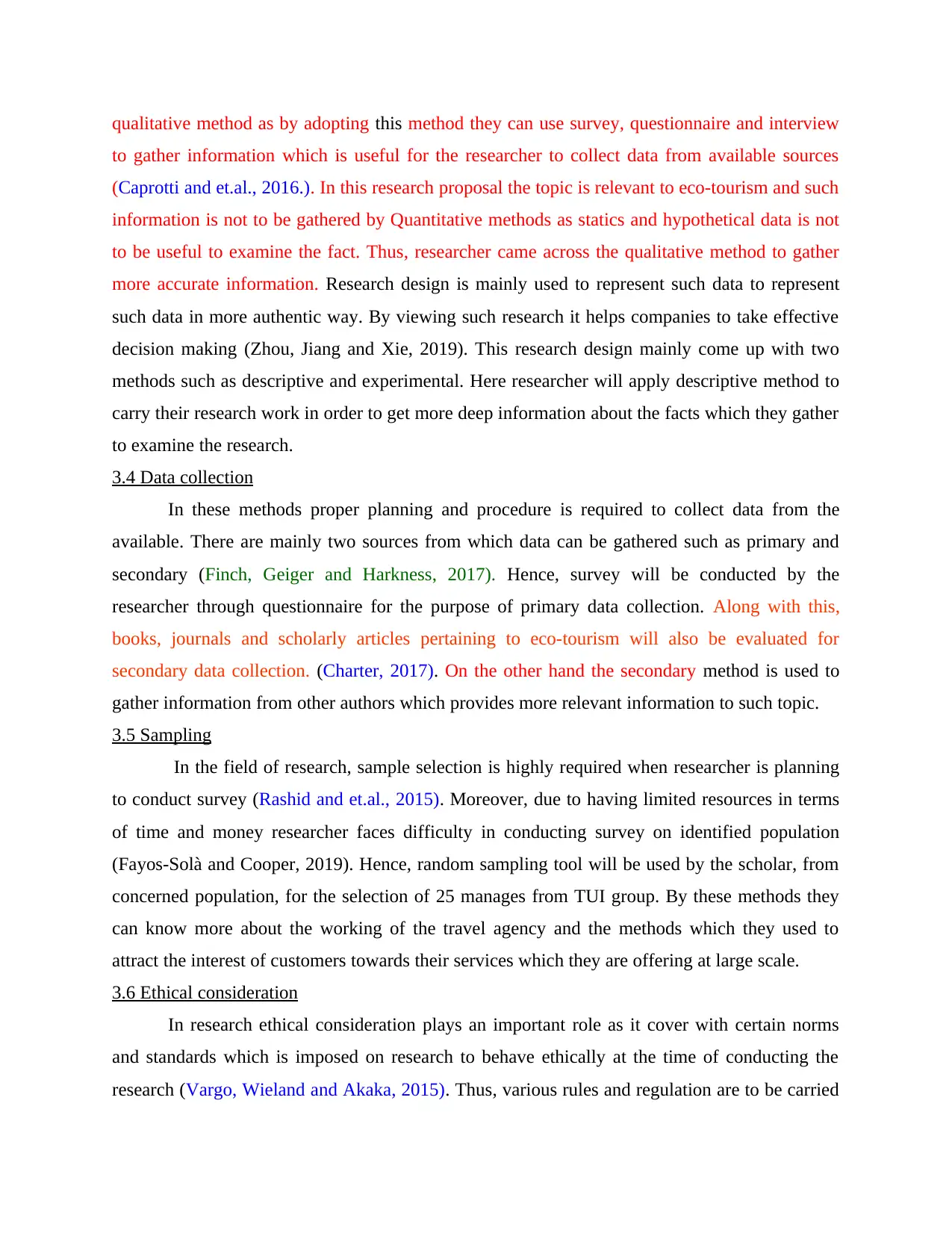
qualitative method as by adopting this method they can use survey, questionnaire and interview
to gather information which is useful for the researcher to collect data from available sources
(Caprotti and et.al., 2016.). In this research proposal the topic is relevant to eco-tourism and such
information is not to be gathered by Quantitative methods as statics and hypothetical data is not
to be useful to examine the fact. Thus, researcher came across the qualitative method to gather
more accurate information. Research design is mainly used to represent such data to represent
such data in more authentic way. By viewing such research it helps companies to take effective
decision making (Zhou, Jiang and Xie, 2019). This research design mainly come up with two
methods such as descriptive and experimental. Here researcher will apply descriptive method to
carry their research work in order to get more deep information about the facts which they gather
to examine the research.
3.4 Data collection
In these methods proper planning and procedure is required to collect data from the
available. There are mainly two sources from which data can be gathered such as primary and
secondary (Finch, Geiger and Harkness, 2017). Hence, survey will be conducted by the
researcher through questionnaire for the purpose of primary data collection. Along with this,
books, journals and scholarly articles pertaining to eco-tourism will also be evaluated for
secondary data collection. (Charter, 2017). On the other hand the secondary method is used to
gather information from other authors which provides more relevant information to such topic.
3.5 Sampling
In the field of research, sample selection is highly required when researcher is planning
to conduct survey (Rashid and et.al., 2015). Moreover, due to having limited resources in terms
of time and money researcher faces difficulty in conducting survey on identified population
(Fayos-Solà and Cooper, 2019). Hence, random sampling tool will be used by the scholar, from
concerned population, for the selection of 25 manages from TUI group. By these methods they
can know more about the working of the travel agency and the methods which they used to
attract the interest of customers towards their services which they are offering at large scale.
3.6 Ethical consideration
In research ethical consideration plays an important role as it cover with certain norms
and standards which is imposed on research to behave ethically at the time of conducting the
research (Vargo, Wieland and Akaka, 2015). Thus, various rules and regulation are to be carried
to gather information which is useful for the researcher to collect data from available sources
(Caprotti and et.al., 2016.). In this research proposal the topic is relevant to eco-tourism and such
information is not to be gathered by Quantitative methods as statics and hypothetical data is not
to be useful to examine the fact. Thus, researcher came across the qualitative method to gather
more accurate information. Research design is mainly used to represent such data to represent
such data in more authentic way. By viewing such research it helps companies to take effective
decision making (Zhou, Jiang and Xie, 2019). This research design mainly come up with two
methods such as descriptive and experimental. Here researcher will apply descriptive method to
carry their research work in order to get more deep information about the facts which they gather
to examine the research.
3.4 Data collection
In these methods proper planning and procedure is required to collect data from the
available. There are mainly two sources from which data can be gathered such as primary and
secondary (Finch, Geiger and Harkness, 2017). Hence, survey will be conducted by the
researcher through questionnaire for the purpose of primary data collection. Along with this,
books, journals and scholarly articles pertaining to eco-tourism will also be evaluated for
secondary data collection. (Charter, 2017). On the other hand the secondary method is used to
gather information from other authors which provides more relevant information to such topic.
3.5 Sampling
In the field of research, sample selection is highly required when researcher is planning
to conduct survey (Rashid and et.al., 2015). Moreover, due to having limited resources in terms
of time and money researcher faces difficulty in conducting survey on identified population
(Fayos-Solà and Cooper, 2019). Hence, random sampling tool will be used by the scholar, from
concerned population, for the selection of 25 manages from TUI group. By these methods they
can know more about the working of the travel agency and the methods which they used to
attract the interest of customers towards their services which they are offering at large scale.
3.6 Ethical consideration
In research ethical consideration plays an important role as it cover with certain norms
and standards which is imposed on research to behave ethically at the time of conducting the
research (Vargo, Wieland and Akaka, 2015). Thus, various rules and regulation are to be carried
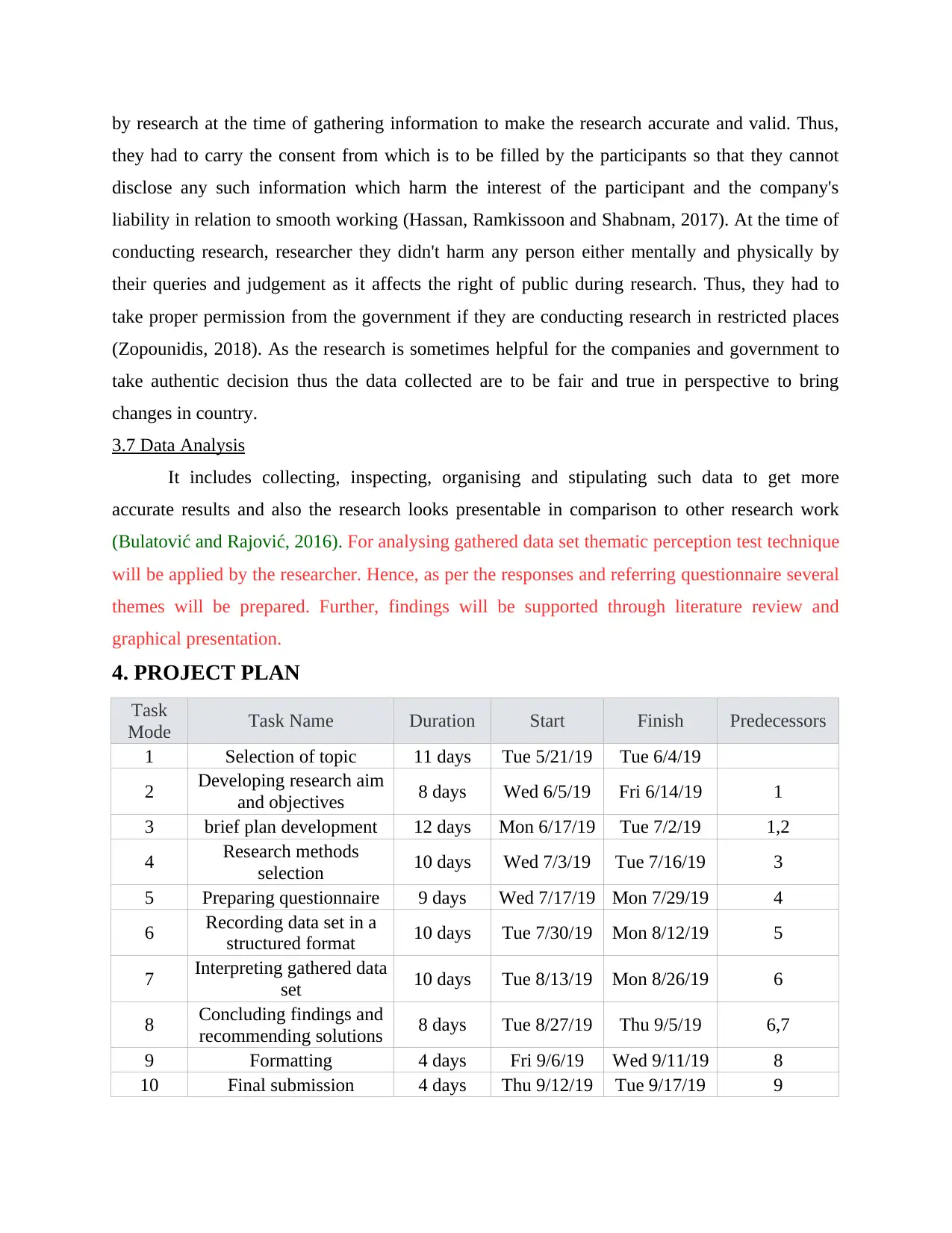
by research at the time of gathering information to make the research accurate and valid. Thus,
they had to carry the consent from which is to be filled by the participants so that they cannot
disclose any such information which harm the interest of the participant and the company's
liability in relation to smooth working (Hassan, Ramkissoon and Shabnam, 2017). At the time of
conducting research, researcher they didn't harm any person either mentally and physically by
their queries and judgement as it affects the right of public during research. Thus, they had to
take proper permission from the government if they are conducting research in restricted places
(Zopounidis, 2018). As the research is sometimes helpful for the companies and government to
take authentic decision thus the data collected are to be fair and true in perspective to bring
changes in country.
3.7 Data Analysis
It includes collecting, inspecting, organising and stipulating such data to get more
accurate results and also the research looks presentable in comparison to other research work
(Bulatović and Rajović, 2016). For analysing gathered data set thematic perception test technique
will be applied by the researcher. Hence, as per the responses and referring questionnaire several
themes will be prepared. Further, findings will be supported through literature review and
graphical presentation.
4. PROJECT PLAN
Task
Mode Task Name Duration Start Finish Predecessors
1 Selection of topic 11 days Tue 5/21/19 Tue 6/4/19
2 Developing research aim
and objectives 8 days Wed 6/5/19 Fri 6/14/19 1
3 brief plan development 12 days Mon 6/17/19 Tue 7/2/19 1,2
4 Research methods
selection 10 days Wed 7/3/19 Tue 7/16/19 3
5 Preparing questionnaire 9 days Wed 7/17/19 Mon 7/29/19 4
6 Recording data set in a
structured format 10 days Tue 7/30/19 Mon 8/12/19 5
7 Interpreting gathered data
set 10 days Tue 8/13/19 Mon 8/26/19 6
8 Concluding findings and
recommending solutions 8 days Tue 8/27/19 Thu 9/5/19 6,7
9 Formatting 4 days Fri 9/6/19 Wed 9/11/19 8
10 Final submission 4 days Thu 9/12/19 Tue 9/17/19 9
they had to carry the consent from which is to be filled by the participants so that they cannot
disclose any such information which harm the interest of the participant and the company's
liability in relation to smooth working (Hassan, Ramkissoon and Shabnam, 2017). At the time of
conducting research, researcher they didn't harm any person either mentally and physically by
their queries and judgement as it affects the right of public during research. Thus, they had to
take proper permission from the government if they are conducting research in restricted places
(Zopounidis, 2018). As the research is sometimes helpful for the companies and government to
take authentic decision thus the data collected are to be fair and true in perspective to bring
changes in country.
3.7 Data Analysis
It includes collecting, inspecting, organising and stipulating such data to get more
accurate results and also the research looks presentable in comparison to other research work
(Bulatović and Rajović, 2016). For analysing gathered data set thematic perception test technique
will be applied by the researcher. Hence, as per the responses and referring questionnaire several
themes will be prepared. Further, findings will be supported through literature review and
graphical presentation.
4. PROJECT PLAN
Task
Mode Task Name Duration Start Finish Predecessors
1 Selection of topic 11 days Tue 5/21/19 Tue 6/4/19
2 Developing research aim
and objectives 8 days Wed 6/5/19 Fri 6/14/19 1
3 brief plan development 12 days Mon 6/17/19 Tue 7/2/19 1,2
4 Research methods
selection 10 days Wed 7/3/19 Tue 7/16/19 3
5 Preparing questionnaire 9 days Wed 7/17/19 Mon 7/29/19 4
6 Recording data set in a
structured format 10 days Tue 7/30/19 Mon 8/12/19 5
7 Interpreting gathered data
set 10 days Tue 8/13/19 Mon 8/26/19 6
8 Concluding findings and
recommending solutions 8 days Tue 8/27/19 Thu 9/5/19 6,7
9 Formatting 4 days Fri 9/6/19 Wed 9/11/19 8
10 Final submission 4 days Thu 9/12/19 Tue 9/17/19 9
⊘ This is a preview!⊘
Do you want full access?
Subscribe today to unlock all pages.

Trusted by 1+ million students worldwide
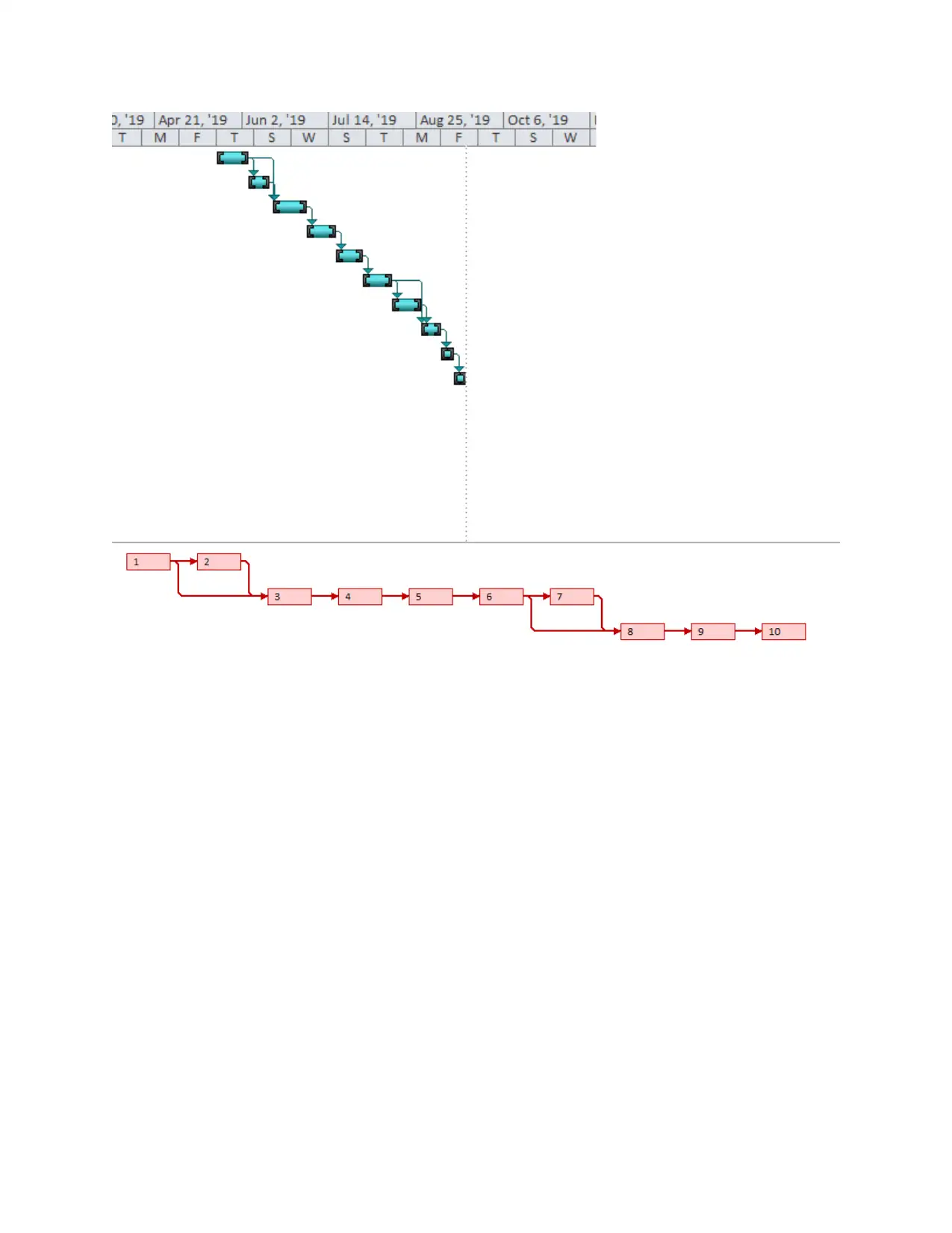
Paraphrase This Document
Need a fresh take? Get an instant paraphrase of this document with our AI Paraphraser
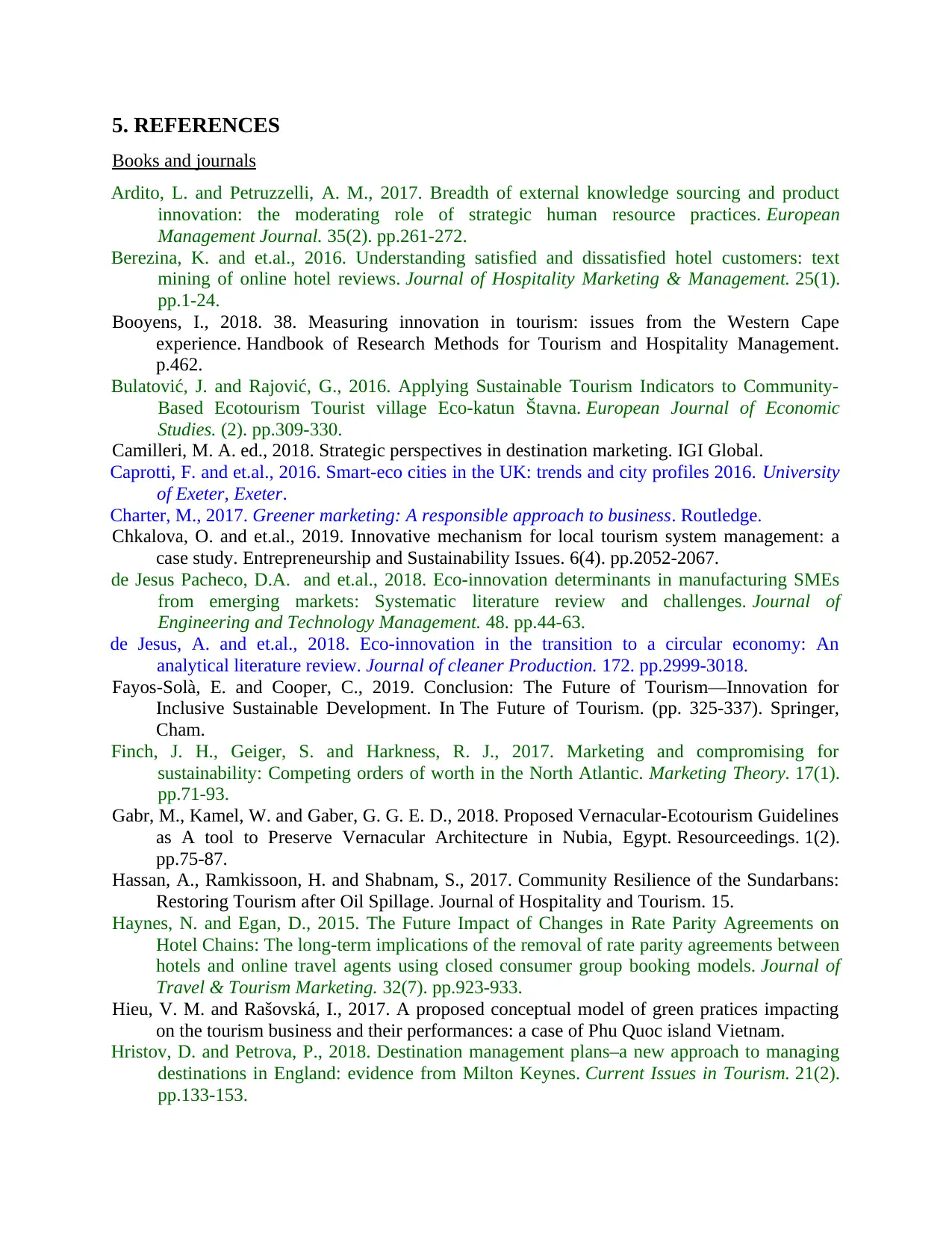
5. REFERENCES
Books and journals
Ardito, L. and Petruzzelli, A. M., 2017. Breadth of external knowledge sourcing and product
innovation: the moderating role of strategic human resource practices. European
Management Journal. 35(2). pp.261-272.
Berezina, K. and et.al., 2016. Understanding satisfied and dissatisfied hotel customers: text
mining of online hotel reviews. Journal of Hospitality Marketing & Management. 25(1).
pp.1-24.
Booyens, I., 2018. 38. Measuring innovation in tourism: issues from the Western Cape
experience. Handbook of Research Methods for Tourism and Hospitality Management.
p.462.
Bulatović, J. and Rajović, G., 2016. Applying Sustainable Tourism Indicators to Community-
Based Ecotourism Tourist village Eco-katun Štavna. European Journal of Economic
Studies. (2). pp.309-330.
Camilleri, M. A. ed., 2018. Strategic perspectives in destination marketing. IGI Global.
Caprotti, F. and et.al., 2016. Smart-eco cities in the UK: trends and city profiles 2016. University
of Exeter, Exeter.
Charter, M., 2017. Greener marketing: A responsible approach to business. Routledge.
Chkalova, O. and et.al., 2019. Innovative mechanism for local tourism system management: a
case study. Entrepreneurship and Sustainability Issues. 6(4). pp.2052-2067.
de Jesus Pacheco, D.A. and et.al., 2018. Eco-innovation determinants in manufacturing SMEs
from emerging markets: Systematic literature review and challenges. Journal of
Engineering and Technology Management. 48. pp.44-63.
de Jesus, A. and et.al., 2018. Eco-innovation in the transition to a circular economy: An
analytical literature review. Journal of cleaner Production. 172. pp.2999-3018.
Fayos-Solà, E. and Cooper, C., 2019. Conclusion: The Future of Tourism—Innovation for
Inclusive Sustainable Development. In The Future of Tourism. (pp. 325-337). Springer,
Cham.
Finch, J. H., Geiger, S. and Harkness, R. J., 2017. Marketing and compromising for
sustainability: Competing orders of worth in the North Atlantic. Marketing Theory. 17(1).
pp.71-93.
Gabr, M., Kamel, W. and Gaber, G. G. E. D., 2018. Proposed Vernacular-Ecotourism Guidelines
as A tool to Preserve Vernacular Architecture in Nubia, Egypt. Resourceedings. 1(2).
pp.75-87.
Hassan, A., Ramkissoon, H. and Shabnam, S., 2017. Community Resilience of the Sundarbans:
Restoring Tourism after Oil Spillage. Journal of Hospitality and Tourism. 15.
Haynes, N. and Egan, D., 2015. The Future Impact of Changes in Rate Parity Agreements on
Hotel Chains: The long-term implications of the removal of rate parity agreements between
hotels and online travel agents using closed consumer group booking models. Journal of
Travel & Tourism Marketing. 32(7). pp.923-933.
Hieu, V. M. and Rašovská, I., 2017. A proposed conceptual model of green pratices impacting
on the tourism business and their performances: a case of Phu Quoc island Vietnam.
Hristov, D. and Petrova, P., 2018. Destination management plans–a new approach to managing
destinations in England: evidence from Milton Keynes. Current Issues in Tourism. 21(2).
pp.133-153.
Books and journals
Ardito, L. and Petruzzelli, A. M., 2017. Breadth of external knowledge sourcing and product
innovation: the moderating role of strategic human resource practices. European
Management Journal. 35(2). pp.261-272.
Berezina, K. and et.al., 2016. Understanding satisfied and dissatisfied hotel customers: text
mining of online hotel reviews. Journal of Hospitality Marketing & Management. 25(1).
pp.1-24.
Booyens, I., 2018. 38. Measuring innovation in tourism: issues from the Western Cape
experience. Handbook of Research Methods for Tourism and Hospitality Management.
p.462.
Bulatović, J. and Rajović, G., 2016. Applying Sustainable Tourism Indicators to Community-
Based Ecotourism Tourist village Eco-katun Štavna. European Journal of Economic
Studies. (2). pp.309-330.
Camilleri, M. A. ed., 2018. Strategic perspectives in destination marketing. IGI Global.
Caprotti, F. and et.al., 2016. Smart-eco cities in the UK: trends and city profiles 2016. University
of Exeter, Exeter.
Charter, M., 2017. Greener marketing: A responsible approach to business. Routledge.
Chkalova, O. and et.al., 2019. Innovative mechanism for local tourism system management: a
case study. Entrepreneurship and Sustainability Issues. 6(4). pp.2052-2067.
de Jesus Pacheco, D.A. and et.al., 2018. Eco-innovation determinants in manufacturing SMEs
from emerging markets: Systematic literature review and challenges. Journal of
Engineering and Technology Management. 48. pp.44-63.
de Jesus, A. and et.al., 2018. Eco-innovation in the transition to a circular economy: An
analytical literature review. Journal of cleaner Production. 172. pp.2999-3018.
Fayos-Solà, E. and Cooper, C., 2019. Conclusion: The Future of Tourism—Innovation for
Inclusive Sustainable Development. In The Future of Tourism. (pp. 325-337). Springer,
Cham.
Finch, J. H., Geiger, S. and Harkness, R. J., 2017. Marketing and compromising for
sustainability: Competing orders of worth in the North Atlantic. Marketing Theory. 17(1).
pp.71-93.
Gabr, M., Kamel, W. and Gaber, G. G. E. D., 2018. Proposed Vernacular-Ecotourism Guidelines
as A tool to Preserve Vernacular Architecture in Nubia, Egypt. Resourceedings. 1(2).
pp.75-87.
Hassan, A., Ramkissoon, H. and Shabnam, S., 2017. Community Resilience of the Sundarbans:
Restoring Tourism after Oil Spillage. Journal of Hospitality and Tourism. 15.
Haynes, N. and Egan, D., 2015. The Future Impact of Changes in Rate Parity Agreements on
Hotel Chains: The long-term implications of the removal of rate parity agreements between
hotels and online travel agents using closed consumer group booking models. Journal of
Travel & Tourism Marketing. 32(7). pp.923-933.
Hieu, V. M. and Rašovská, I., 2017. A proposed conceptual model of green pratices impacting
on the tourism business and their performances: a case of Phu Quoc island Vietnam.
Hristov, D. and Petrova, P., 2018. Destination management plans–a new approach to managing
destinations in England: evidence from Milton Keynes. Current Issues in Tourism. 21(2).
pp.133-153.
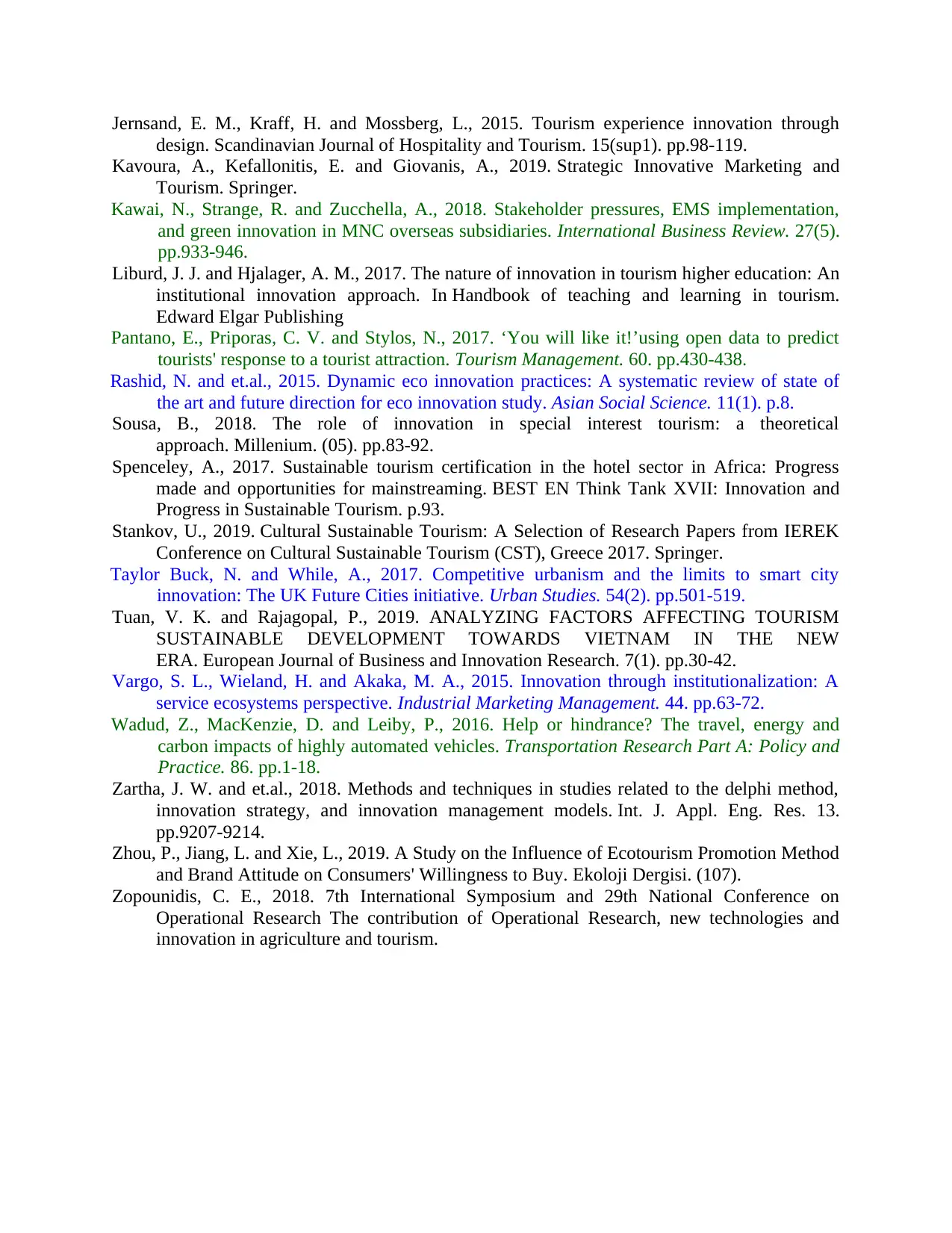
Jernsand, E. M., Kraff, H. and Mossberg, L., 2015. Tourism experience innovation through
design. Scandinavian Journal of Hospitality and Tourism. 15(sup1). pp.98-119.
Kavoura, A., Kefallonitis, E. and Giovanis, A., 2019. Strategic Innovative Marketing and
Tourism. Springer.
Kawai, N., Strange, R. and Zucchella, A., 2018. Stakeholder pressures, EMS implementation,
and green innovation in MNC overseas subsidiaries. International Business Review. 27(5).
pp.933-946.
Liburd, J. J. and Hjalager, A. M., 2017. The nature of innovation in tourism higher education: An
institutional innovation approach. In Handbook of teaching and learning in tourism.
Edward Elgar Publishing
Pantano, E., Priporas, C. V. and Stylos, N., 2017. ‘You will like it!’using open data to predict
tourists' response to a tourist attraction. Tourism Management. 60. pp.430-438.
Rashid, N. and et.al., 2015. Dynamic eco innovation practices: A systematic review of state of
the art and future direction for eco innovation study. Asian Social Science. 11(1). p.8.
Sousa, B., 2018. The role of innovation in special interest tourism: a theoretical
approach. Millenium. (05). pp.83-92.
Spenceley, A., 2017. Sustainable tourism certification in the hotel sector in Africa: Progress
made and opportunities for mainstreaming. BEST EN Think Tank XVII: Innovation and
Progress in Sustainable Tourism. p.93.
Stankov, U., 2019. Cultural Sustainable Tourism: A Selection of Research Papers from IEREK
Conference on Cultural Sustainable Tourism (CST), Greece 2017. Springer.
Taylor Buck, N. and While, A., 2017. Competitive urbanism and the limits to smart city
innovation: The UK Future Cities initiative. Urban Studies. 54(2). pp.501-519.
Tuan, V. K. and Rajagopal, P., 2019. ANALYZING FACTORS AFFECTING TOURISM
SUSTAINABLE DEVELOPMENT TOWARDS VIETNAM IN THE NEW
ERA. European Journal of Business and Innovation Research. 7(1). pp.30-42.
Vargo, S. L., Wieland, H. and Akaka, M. A., 2015. Innovation through institutionalization: A
service ecosystems perspective. Industrial Marketing Management. 44. pp.63-72.
Wadud, Z., MacKenzie, D. and Leiby, P., 2016. Help or hindrance? The travel, energy and
carbon impacts of highly automated vehicles. Transportation Research Part A: Policy and
Practice. 86. pp.1-18.
Zartha, J. W. and et.al., 2018. Methods and techniques in studies related to the delphi method,
innovation strategy, and innovation management models. Int. J. Appl. Eng. Res. 13.
pp.9207-9214.
Zhou, P., Jiang, L. and Xie, L., 2019. A Study on the Influence of Ecotourism Promotion Method
and Brand Attitude on Consumers' Willingness to Buy. Ekoloji Dergisi. (107).
Zopounidis, C. E., 2018. 7th International Symposium and 29th National Conference on
Operational Research The contribution of Operational Research, new technologies and
innovation in agriculture and tourism.
design. Scandinavian Journal of Hospitality and Tourism. 15(sup1). pp.98-119.
Kavoura, A., Kefallonitis, E. and Giovanis, A., 2019. Strategic Innovative Marketing and
Tourism. Springer.
Kawai, N., Strange, R. and Zucchella, A., 2018. Stakeholder pressures, EMS implementation,
and green innovation in MNC overseas subsidiaries. International Business Review. 27(5).
pp.933-946.
Liburd, J. J. and Hjalager, A. M., 2017. The nature of innovation in tourism higher education: An
institutional innovation approach. In Handbook of teaching and learning in tourism.
Edward Elgar Publishing
Pantano, E., Priporas, C. V. and Stylos, N., 2017. ‘You will like it!’using open data to predict
tourists' response to a tourist attraction. Tourism Management. 60. pp.430-438.
Rashid, N. and et.al., 2015. Dynamic eco innovation practices: A systematic review of state of
the art and future direction for eco innovation study. Asian Social Science. 11(1). p.8.
Sousa, B., 2018. The role of innovation in special interest tourism: a theoretical
approach. Millenium. (05). pp.83-92.
Spenceley, A., 2017. Sustainable tourism certification in the hotel sector in Africa: Progress
made and opportunities for mainstreaming. BEST EN Think Tank XVII: Innovation and
Progress in Sustainable Tourism. p.93.
Stankov, U., 2019. Cultural Sustainable Tourism: A Selection of Research Papers from IEREK
Conference on Cultural Sustainable Tourism (CST), Greece 2017. Springer.
Taylor Buck, N. and While, A., 2017. Competitive urbanism and the limits to smart city
innovation: The UK Future Cities initiative. Urban Studies. 54(2). pp.501-519.
Tuan, V. K. and Rajagopal, P., 2019. ANALYZING FACTORS AFFECTING TOURISM
SUSTAINABLE DEVELOPMENT TOWARDS VIETNAM IN THE NEW
ERA. European Journal of Business and Innovation Research. 7(1). pp.30-42.
Vargo, S. L., Wieland, H. and Akaka, M. A., 2015. Innovation through institutionalization: A
service ecosystems perspective. Industrial Marketing Management. 44. pp.63-72.
Wadud, Z., MacKenzie, D. and Leiby, P., 2016. Help or hindrance? The travel, energy and
carbon impacts of highly automated vehicles. Transportation Research Part A: Policy and
Practice. 86. pp.1-18.
Zartha, J. W. and et.al., 2018. Methods and techniques in studies related to the delphi method,
innovation strategy, and innovation management models. Int. J. Appl. Eng. Res. 13.
pp.9207-9214.
Zhou, P., Jiang, L. and Xie, L., 2019. A Study on the Influence of Ecotourism Promotion Method
and Brand Attitude on Consumers' Willingness to Buy. Ekoloji Dergisi. (107).
Zopounidis, C. E., 2018. 7th International Symposium and 29th National Conference on
Operational Research The contribution of Operational Research, new technologies and
innovation in agriculture and tourism.
⊘ This is a preview!⊘
Do you want full access?
Subscribe today to unlock all pages.

Trusted by 1+ million students worldwide
1 out of 12
Related Documents
Your All-in-One AI-Powered Toolkit for Academic Success.
+13062052269
info@desklib.com
Available 24*7 on WhatsApp / Email
![[object Object]](/_next/static/media/star-bottom.7253800d.svg)
Unlock your academic potential
Copyright © 2020–2026 A2Z Services. All Rights Reserved. Developed and managed by ZUCOL.





